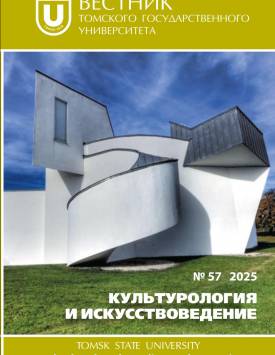Stravinsky’s adaptations of the folk motifs in the ballet The Rite of Spring
Stravinsky’s The Rite of Spring differs from the types of theatrical art. To some extent, the folk motifs enriched the ballet with historical authenticity. The research will show the succession in the development of Stravinsky’s Russian style period. One of the features of this ballet is the motifs of folk songs. The ballet includes the variations of the Lithuanian wedding songs You are my little sister, When I walked acro.s.s the yard, My old Father and the Russian wedding songs Come oh crony mine, The little duck was bathing in the .sea. The article argues that the adaptations of the folk songs in The Rite of Spring were applied with the modifications in meter and rhythm. To justify this hypothesis, five excerpts of the songs and their variations were examined as to the characteristics in question added with tonality. While the previous research on the folklore in The Rite of Spring focused on identifying Lithuanian and Russian songs, in particular the works by L. Morton, R. Taruskin, I.Ya. Vershinina, S.I. Savenko, or some scholars mentioned only the presence of folk melodies, the current article studies the similarities and contrasts of the folk melodies and the versions in the ballet. The analysis of each of the folk songs is accompanied with the information about its origin. The study of the arranged for The Rite of Spring folk songs confirms the hypothesis that the majority of them has the meter and rhythm modified. In all the adaptations, the meter is made into compound except in When I walked acro.s.s the yard, with a simple meter. The adaptations contain a changing meter excluding the one for My old Father. The introduction of minor values shows the influence on the rhythm. The ballet presents the style of Stravinsky’s mentor in composing Rimsky-Korsakov: the choice of ritual songs, syncopation and counterpoint. Generally, the rhythmic modifications contribute to the changes in the intonation. Besides, some of the adaptations has a modified register, which is possibly determined by setting vocal folk music for performing by wind instruments. Many of the variations are played solo followed by the variational development with the instruments of the whole orchestra. The arrangements of the folk songs being as if added to the monotonous music represent the context for folk flair. Overall, addressing the subject of pra-Slavonic society, Stravinsky contributed to the development of national Romanticism in Russian music. The author declares no conflicts of interests.
Keywords
folklore,
I. Stravinsky,
The Rite of Spring,
N. Rimsky-Korsakov,
A. JuskaAuthors
| Kalashnikov Alexander V. | National Research University Higher School of Economics | remkas@mail.ru |
Всего: 1
References
Taruskin R. Stravinsky and the Russian traditions a biography of the works through Mavra. Los Angeles: University of California press, 1996. 967 p.
Римский-Корсаков Н.А. Летопись моей музыкальной жизни. М.: Согласие, 2004. 608 с.
Друскин М.С. Собрание сочинений: в 7 т. Т. 4: Игорь Стравинский. СПб.: Композитор - Санкт-Петербург, 2009. 584 с.
Баранова Т.В. Стравинский в работе над "Весной священной" (Об эскизах к балету в собрании Фонда Пауля Захара) // Научный вестник Московской консерватории. 2015. № 3. С. 52-87.
Taruskin R.Russian Folk Melodies in The Rite of Spring // Journal of the American Musicological Society. 1980. № 3. P. 501-543.
Stravinsky I. Le Sacre du Printemps. Partition. London: Boosey and Hawkes, 1948. 139 p.
Stravinsky I. The Rite of Spring. Sketches 1911-1913. Facsimile Reproductions from the Autograph. London: Boosey and Hawkes, 1969. 48 p.
Morton L. Footnotes to Stravinsky studies: 'Le Sacre du printemps' // Tempo. 1979. № 128. P. 9-16.
Вершинина И.Я. Ранние балеты Стравинского. М.: Наука, 1967. 222 с.
Савенко С.И. Мир Стравинского. М.: Композитор, 2001. 328 с.
Стравинский И.Ф. Диалоги. Л.: Музыка, 1971. 415 с.
Petrauskaite D. Lithuanian Passages in Music and Life of Foreign Composers // Lithuanian musicology. 2008. № 9. P. 108-121.
Варунц В.П. Стравинский И.Ф. - публицист и собеседник. М.: Сов. композитор, 1988. 504 c.
Головинский Г.Л. Стравинский и фольклор. Наблюдения и заметки // И.Ф. Стравинский. Статьи. Воспоминания / сост. Г.С. Алфеевская, И.Я. Верещагина. М.: Сов. композитор, 1985. С. 68-94.
Стравинский И.Ф. Хроника. Поэтика. М.: Центр гуманитарных инициатив, 2012. 368 с.
Городецкий С.М. Ярь. Стихи лирические и лиро-поэтические. СПб.: б. и., 1907. 127 с.
Варунц В.П. Вокруг "Весны Священной" // Звуковая среда современности: сб. статей памяти М.Е. Тараканова (1928-1996) / сост. Е.М. Тараканова. М.: ГИИ, 2012. С. 166-205.
Рерих Н.К. Держава света. М.: Эксмо-Пресс, 2017. 280 с.
Juszkiewicz A. Melodje ludowe litewskie. Krakow: Wydawnctwo Akademji Umiejetnosci, 1900. 247 S.
Чюрлените Я.К. Литовское народное песенное творчество. М.; Л.: Музыка, 1966. 328 с.
Песни разных народов. М.: Университетская типография, 1854. 556 с.
Kelly R. The Big Band and the Piano: Nikolai Kapustin's Variations Op. 41. Las Vegas: University of Nevada, 2016. 69 p.
Petersen P. Hans Werner Henze und Karl Amadeus Hartmann: Ein Ruckblick auf ihre Freundschaft und Zusammenarbeit // Archiv fur Musikwissenschaft. 2014. № 1. S. 65-83.
Юшкевич И.А. Литовские народные песни с переводом на русский язык. СПб.: Императорская академия наук, 1867.
Мессиан О. Анализ "Весны священной" Стравинского. Ритмические персонажи // Устилуг - Hollywood: О Стравинском и его творчестве: сб. статей. СПб.: Композитор, 2011. С. 137-211.
Римский-Корсаков Н.А. Сто русских народных песен. М.; Л.: Гос. муз. изд-во, 1951. 184 с.
Прач И., Львов Н.А. Собрание народных русских песен с их голосами. СПб.: Типография Горного училища, 1790. 209 с.
Вильбоа К.П. Русские народные песни. Записанные с народного напева и арранжированные для одного голоса с аккомпанементом фортепиано К. Вильбоа. СПб.: Стелловский, 1860. 158 с.
Чайковский П.И. Попурри из оперы "Воевода" // Полное собрание сочинений / ред. Б.В. Асафьев. М.; Л.: Гос. муз. изд-во, 1946. С. 197-215.
Чайковский П.И. Пятьдесят русских народных песен. Для фортепиано в четыре руки. М.: Совр. музыка, 2013. 60 с.
Майков А.Н. Кантата, написанная ко дню священного коронования их императорских величеств государя императора и государыни императрицы / стихи А. Майкова; музыка П. Чайковского. СПб.: Паровая скоропечатня П.О. Яблонского, 1894. 14 с.

